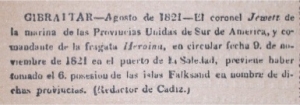Never has the UN accepted that the British settlers in Malvinas are a “party” to the dispute. The UN has always made it clear that there are only two parties to the dispute over sovereignty: Argentina and the UK. The UN has asked them both to duly take into account the “interests” of the inhabitants of the islands in their bilateral negotiations. No international organization or forum has ever accepted that the British subjects in the islands can be a party to the dispute different from their country of citizenship.
It is only now that the UK is forcing to present its citizens in the islands as someone different from the metropolis and a so-called “third party” in the controversy. Only now because islanders have participated in bilateral meetings with Argentina always as members of the UK delegation.
After the UK accepted to comply with resolution 2065 (XX) in 1966, Argentina and the UK held several discussions over the Islands over two decades. Both countries began a series of conversations and discussed different options to settle the dispute, including a transfer of sovereignty, joint administration or a leaseback of the islands. There were even draft documents in which Great Britain recognized the Argentine sovereignty over the Islands and, like the 1968 Memorandum of Understanding, were initiated by both delegations.
During the 70’s, while both countries negotiated over sovereignty and communications to and from the islands, islanders were part of the British delegation to the bilateral meetings. Meetings were always bilateral, as mandated by the UN, by that did not prevent islanders from being members of their country’s delegation. Argentina never opposed and favored their participation because their “interests” were always part of the aspects to take into account in the bilateral conversations. So much so that the Joint Statement of 1st July 1971 made it clear when it expressed that the two parties to the negotiations were “delegations of the Government of the United Kingdom of Great Britain and Northern Ireland and of the Argentine Republic, THE FORMER INCLUDING PARTICIPANTS FROM THE ISLANDS”.
Successive Argentine-British meetings held in the 90 and 2000’s on several issues relating to the dispute included islanders always as part of UK delegations to bilateral meetings. Never has the UK presented these meetings as “trilateral”.
Argentina has always declared that it is committed to respecting the interests and the way of life of the inhabitants of the islands pursuant to the tenets of the successive resolutions adopted by the UN and international fora.
It is clear that the UK resorts to this new argument only to contradict its own behavior and to confirm its disregard of international law.












Recent Comments